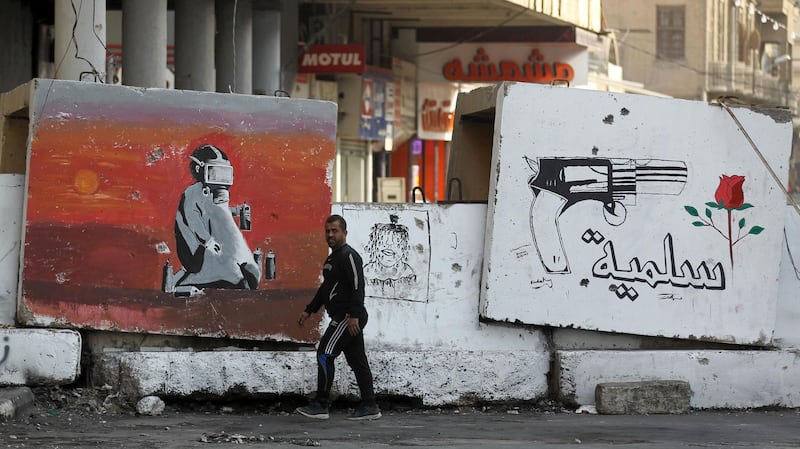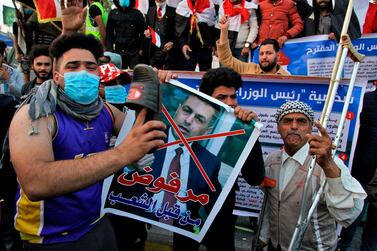An outspoken lraqi liberal lawmaker has nominated himself for the position of prime minister, saying he has public backing and is in talks with parliament’s political factions.
For nearly three months, the government has failed to calm public anger aimed at ending corruption and halting Iran’s dominant influence.
Faiq Sheikh Ali, known to be a critic of Iraq's endemic corruption, told The National that he is the only candidate that can calm public frustration and put an end to the anti-protest movement.
“I decided to nominate myself as an independent candidate for the position of the prime minister because Iraqi protesters are calling for my appointment,” he said.
They are calling for the overhaul of the country’s political class and demanding early elections.
More than 450 people have been killed and thousands injured since the protest movement erupted in early October.
Mr Sheikh Ali has a strong following on social on social media with over 300,000 followers on Twitter.
Over 80 polls have been carried out on Twitter and Facebook that favoured Mr Sheikh Ali’s nominations during the last few weeks. Although not rigorous, professional surveys, he claims they give him a mandate.
“The lowest voter percentage I received was 71 per cent. I recently conducted a survey on my social media page which got 73 per cent of votes, others have reached 95 per cent,” he said.
More than 100,000 people took part in the most recent online polls.
"These reasons are enough to convince me that I have the potential to bear responsibility and achieve the aspirations of the Iraqi people," he said.
Demonstrators have rallied for almost three months in attempt to oust the country's political class. The movement pushed outgoing prime minister Adel Abdul Mahdi to resign in November after the most powerful religious authority in the country, Grand Ayatollah Ali Al Sistani, withdrew support for his government.
Iraqi satirist Ahmed Al Basheer, who is described as Iraq’s Jon Stewart, conducted a poll on his Twitter page on whether his followers would endorse Mr Sheikh Ali’s candidacy on Thursday.
Over 60,000 people participated in the online poll and Mr Sheikh Ali revived over 80 per cent of their votes.
يلله ..
— Ahmed Albasheer -احمد البشير (@ahmedalbasheer1) December 26, 2019
هليومين راح نسوي كمشة استفتاءات حتى نشوف وجهات نظركم باشياء مختلفة..
الاستفتاء الاول:
هل توافق على تولّي فائق الشيخ علي منصب رئاسة مجلس الوزراء في المرحلة المقبلة؟
“From my point of view, no one from the corrupt political class will be able to fulfill the ambitions, aspirations and demands of the Iraqi people,” Mr Sheikh Ali said.
He said he has been in contact with officials in Baghdad and a number of parliamentarians are in favour of his nomination.
The Iraqi official said he has the backing of some lawmakers from the Iran-backed Binaa bloc, populist cleric Moqtada Al Sadr’s Sairoon bloc as well as Kurdish, Sunni, Christian and minority parties.
“A few days ago a number of MPs cited my name and said ‘let’s pick Faiq Sheikh Ali because he is capable of putting an end to the country’s crisis’,” he said.
He said he is also in constant talks with President Barham Salih.
The president handed his resignation to parliament on Thursday after refusing to endorse a nominee for the prime ministership from an Iran-backed political group.
Parliament’s Binaa bloc on Wednesday nominated Assad Al Eidani, the governor of Basra and a former minister of youth and sports.
“Assad Al Eidani will fail, if the president and parliament approves him, this will indicate very precisely that Iraq has officially been handed over to Iran,” Mr Sheikh Ali said.
Protesters rejected the nomination of Mr Al Eidani by blocking roads and bridges across the capital and southern cities.
Mr Sheikh Ali said that Washington
He gained a parliamentary seat last year after promising to counter Islamists' efforts to ban alcohol in the country.
In September, the parliament stripped Mr Sheikh Ali of his immunity from prosecution following accusations that he praised Saddam Hussein's Baath party, despite his long history of opposing the executed dictator.
But Mr Sheikh Ali had gone into exile in the 1990s because of his opposition to Saddam and returned after the dictator was ousted in the US-led 2003 invasion.







